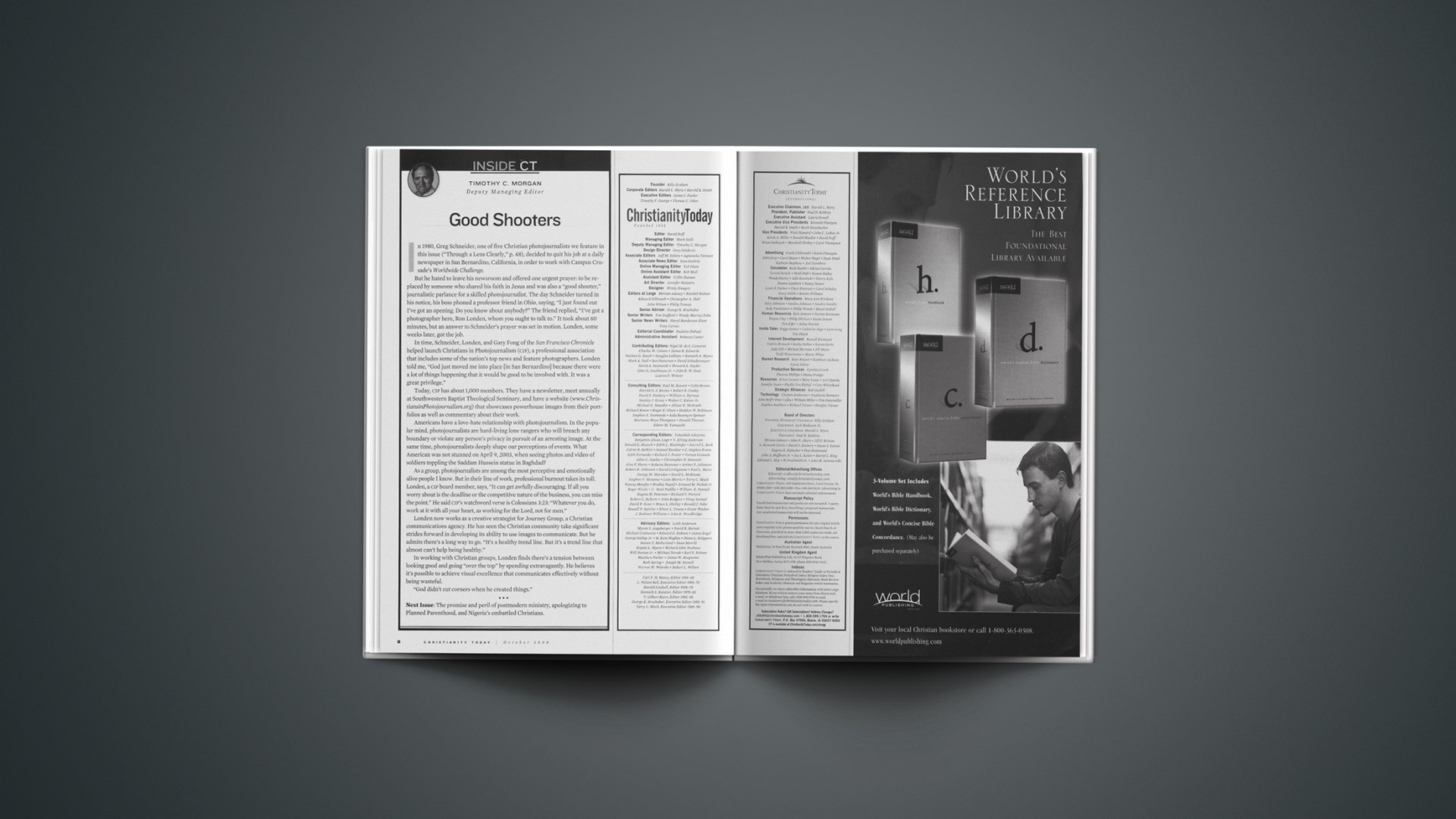In 1980, Greg Schneider, one of five Christian photojournalists we feature in this issue (“Through a Lens Clearly,” p. 48), decided to quit his job at a daily newspaper in San Bernardino, California, in order to work with Campus Crusade’s Worldwide Challenge.
But he hated to leave his newsroom and offered one urgent prayer: to be replaced by someone who shared his faith in Jesus and was also a “good shooter,” journalistic parlance for a skilled photojournalist. The day Schneider turned in his notice, his boss phoned a professor friend in Ohio, saying, “I just found out I’ve got an opening. Do you know about anybody?” The friend replied, “I’ve got a photographer here, Ron Londen, whom you ought to talk to.” It took about 60 minutes, but an answer to Schneider’s prayer was set in motion. Londen, some weeks later, got the job.
In time, Schneider, Londen, and Gary Fong of the San Francisco Chronicle helped launch Christians in Photojournalism (CIP), a professional association that includes some of the nation’s top news and feature photographers. Londen told me, “God just moved me into place [in San Bernardino] because there were a lot of things happening that it would be good to be involved with. It was a great privilege.”
Today, CIP has about 1,000 members. They have a newsletter, meet annually at Southwestern Baptist Theological Seminary, and have a website that showcases powerhouse images from their portfolios as well as commentary about their work.
Americans have a love-hate relationship with photojournalism. In the popular mind, photojournalists are hard-living lone rangers who will breach any boundary or violate any person’s privacy in pursuit of an arresting image. At the same time, photojournalists deeply shape our perceptions of events. What American was not stunned on April 9, 2003, when seeing photos and video of soldiers toppling the Saddam Hussein statue in Baghdad?
As a group, photojournalists are among the most perceptive and emotionally alive people I know. But in their line of work, professional burnout takes its toll. Londen, a CIP board member, says, “It can get awfully discouraging. If all you worry about is the deadline or the competitive nature of the business, you can miss the point.” He said CIP’s watchword verse is Colossians 3:23: “Whatever you do, work at it with all your heart, as working for the Lord, not for men.”
Londen now works as a creative strategist for Journey Group, a Christian communications agency. He has seen the Christian community take significant strides forward in developing its ability to use images to communicate. But he admits there’s a long way to go. “It’s a healthy trend line. But it’s a trend line that almost can’t help being healthy.”
In working with Christian groups, Londen finds there’s a tension between looking good and going “over the top” by spending extravagantly. He believes it’s possible to achieve visual excellence that communicates effectively without being wasteful.
“God didn’t cut corners when he created things.”
Next Issue: The promise and peril of postmodern ministry, apologizing to Planned Parenthood, and Nigeria’s embattled Christians.
Copyright © 2004 Christianity Today. Click for reprint information.
Related Elsewhere:
Also posted today is part 5 of 5 in our series on Christian photojournalists: John H. White: Mercy Over Justice.
Thursday, we featured Greg Schneider.
Wednesday, we featured Mei-Chun Jau.
Tuesday, we featured Jon Warren.
Monday, we featured Joanna Pinneo.
More about Christians in Photojournalism, including more pictures, is available on their website.
Other Christianity Today photo essays include:
Saving Strangers | The journey of one Somali Bantu family in the largest group resettlement of African refugees in U.S. history. (July 02, 2004)
River Deep Mercy Wide | A medical journey on the Rio Negro in Brazil’s Amazon Basin (Feb. 06, 2004)










